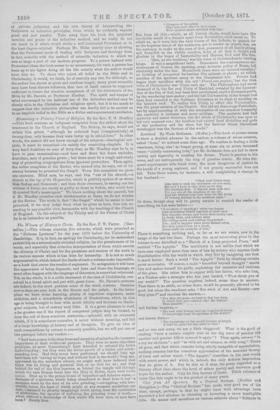Loveland. By Wade Robinson. (Moffat.)—This book of poems seems to
show a decided advance in the author, a volume of whose sonnets, called "Iona," wo noticed some time ago. We confess to fooling a little weariness, being, alas ! no longer young, at some six or seven thousand versos "chiefly concerning love," yet Mr. Robinson does not fail to show variety and ingenuity in treating his theme. There is passion in his verse, and not unfrequently the ring of genuine music. He tries fre- quent experiments with blank verso, the most dangerous of metros in the hands of a young aspirant, and if not greatly successful, does not fail. Take those versos, for instauco, a wife oomplaining of change in her husband "Once your kisses came
Like bees to suck my sweetness (so you said), Rot now I have to trap them as wo trap The Mindless diem 0 Harold, bear with me For you are all the sunshine of my life, And ore without your love were but like fields Of iceberg drifting in the northern night."
Or these, though they will be pretty certain to remind the reader of something ho has seen before :—
"O mockery of marriage: when two hearts Like mountains looked together at their base Rise separate thence, and bathe their lonely tops In frosty skies, and solitary meet Too rolling storm and rattling thunderbolt ; Yea; and iu happier times more distant seem, Not thou united even by a cloud, Alone amid the solitudes of blue."
There is something striking and, as far as wo arc aware, now in the imago of the last two lines. Perhaps the most interesting piece in the volume is one described as a I, Sketch of a Long-projected Poem," and entitled "The Agapist." The machinery is not unlike that which we have seen employed more than once of late by writers who express their dissatisfaction with the world in which they live by imagining one that is much bettor: Such a world " The Agapist" finds by climbing certain great mountains. Of course, a maid "beautiful beyond thought " moots him and makes herself his guide, explaining the manners and customs of the place. She takes him to supper with her father, who asks him, as a Yankee asks a stranger who has just landed, "What think you of our world?" The question requires, indeed, some time to answer. That there is no strife, no crime there, would bo generally allowed to be good, but when the wanderer asks, "But what of Art and Beauty—are they gone ?" and receives the answer,— " Yes, they are gone—at least in that low form In which they once existed—tho' the highest
Thou possible" . .
and further inquires,-
" But how with Science and the long-hived stores Of knowledge from the gardens of the world?"
and learns that,— " The knowledge of this world became at length A load too great for any mind to boar," and so was cast away, wo are a little staggered. What is the good of reading "how a certain empire rose as one big wave of passion till another and greater billow covered it again" ? Then again, science "is a toy for children" ; and "as with art and science, so with song," These all gone, and that which remains being wholly incapable of appreciation, nothing remains but the conscious appreciation of the material beauty of form and colour which "Tho Agapist" describes in his new world with much power, and which is, indeed, the only definite impression that ho gives of it. But be this as it may, the poem regarded as a literary effort rises above the level of minor poetry and warrants good hopes for the author. Only lot him beware of haste. Thick volumes of verse like this ought to be the product of many years.


































 Previous page
Previous page